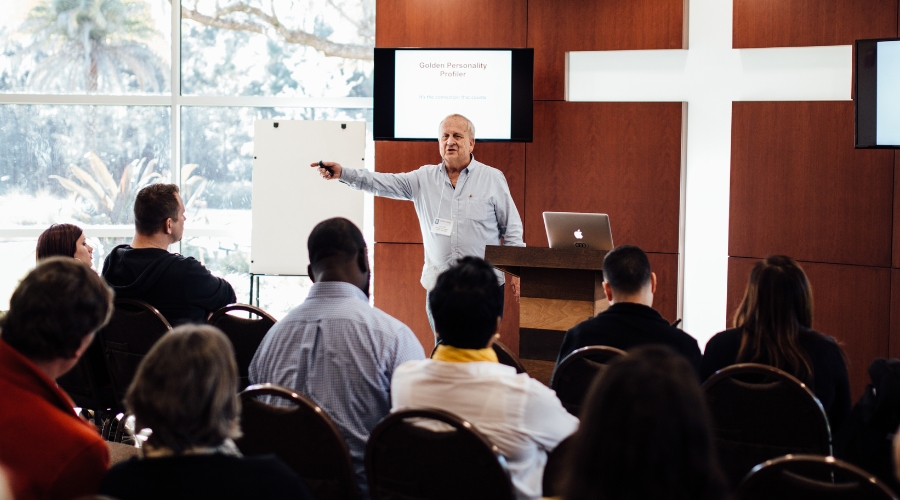
Church planters: They’re a unique breed. A successful church planter must have significant skills in pioneering and tenacity, as well as shepherding, theological training and the skills and confidence to preach. They are often (but not always) extroverted, able to network within communities, then nurture community within a church.
Dr. Jerry Dahl, a Minneapolis psychotherapist and adjunct professor at Bethel University, began to understand this unique calling back in the early 1990s. Upon Converge’s first Church Planting Assessment Center (CPAC), Dahl had been selected “randomly” as the conference’s therapist, simply based on a receptionist’s and patient’s recommendation. Each assessment center, held around the United States, evaluated whether applicants would be recommended as a potential lead church planter in a new church plant.
God had big plans for Jerry Dahl.
Jerry began to comprehend the bold faith of prospective church planters who surrendered all of the security of an existing church to reach lost people through the work of the church, while knowing little of what that would entail. These God-created entrepreneurial spirits inspired Jerry, as did the passion of the CPAC team to empower healthy future church leaders.
The assessment process required its own bravery. Jerry’s son, Steve, who later partnered with him in CPAC, explains that applicants “are feeling led to something — they want something — and the assessment is the gateway to that. So the temptation is to think, ‘How did you do?’ As if the assessment is a performance.”
All of us are frequently asked to perform in some capacity, he clarifies. “Take preaching. There’s an element that’s a performance. We try and want to do well because it matters; it’s significant.”
But an assessment aims to “reflect back to these people what we see. ‘Have you seen this before?’ It’s similar to looking at the back of your own head in a mirror. Have you seen yourself from this angle?”
For a driven potential pastor, assessment proves a vital, revealing step before the pressure cooker and personality amplification of ministry. As Robert Murray M’Cheyne wisely wrote, “What a man is on his knees before God, that he is, and nothing more.”
‘And Such Were Some of You’
In these private, one-on-one sessions with a ministry couple or individual, Jerry capitalized on a once-in-a-lifetime window to gently reveal and discuss unresolved issues, even through difficult conversations. He might counsel exposed marital issues or issues of spiritual maturity.
He often helped pastors release what they didn’t need to carry — perhaps childhood abuse or a pornography problem in their teen years — and didn’t need to define who they were today.
Steve reflects, “Satan would like to remind you of who you were, not who you are.” In 1 Corinthians 6:10-11, Paul unfurls a list of vices, yet directly states, “And such were some of you. But you were washed, you were sanctified, you were justified in the name of the Lord Jesus Christ and by the Spirit of our God” (emphasis added).
Jerry knew well the need for these church planters to offer others the freedom in Christ that they had deeply, abundantly, and intimately experienced (see Hebrews 12:1-2). It’s part of what would make their gospel — an overflow of their own lives — irresistible.
Those impacted by CPAC remain immeasurable. And among those beneath Jerry’s care, trickling through CPAC, would be Darryn Scheske, now chairman of the board for Converge, and Marlan Mincks, current Converge Director of Church Planting.

When the Answer is No
By necessity, the assessment process often leads to open or closed ministry doors. Yet no matter the individual’s agenda, the value of assessment lies in receiving honest, thorough feedback and counsel before a significant ministry step.
One pastor reflected that his status of “not recommended” was one of the greatest messages he could have received. This clear, closed door — tough for that pioneering church-planter spirit — meant this pastor joined another church, which later planted many churches.
As 1 Corinthians 12:17-18 says, “If the whole body were an ear, where would be the sense of smell? But as it is, God arranged the members in the body, each one of them, as he chose.” Church planting may seem the most illustrious ministry to the CPAC crowd, but following the will and timing of God to whatever role He’d chosen remained far more important.
The “Exchanged Life”
Jerry had experienced his own life-altering disapproval directly before the first CPAC, when he was encouraged to leave the Minneapolis Clinic of Psychiatry and Neurology. Prior to this crushing blow, people might have implied that God was lucky to have someone as talented and accomplished as Jerry Dahl on His team. And Jerry might have agreed.
But at 53, he set out on a new endeavor in both his private practice and CPAC. Jerry described his humbling professional rejection as his own reckoning, as his “exchanged life,” an event he described at the close of every CPAC.
Jerry was no longer just a believer in Christ working as a psychotherapist. He was now living out Galatians 2:20: “I have been crucified with Christ. It is no longer I who live, but Christ who lives in me.”
Jerry loved to tell his testimony. He was fond of saying, “If you’ve been blessed by someone, it’s not Jerry Dahl. It’s Christ living and ministering and working through me.”
Therapist and CPAC partner Dee Jones would agree. “It was evident Jerry had walked through hard things before, and his faith in God had been fortified through those trials. He was humble and he was confident in God. He blessed people with his knowledge and experiences, rather than making them feel small or holding it over them.
“I believe Jerry had been staring into the face of God for much of his life,” Dee continued. “And that made him remarkable — how he reflected God to the world.” Jerry “spoke life and care and healing” into countless candidates, as well as ministry partners like herself.
And Paul Johnson, the first CPAC director, remembers, “Jerry always had a huge grin on his face as he talked about his life with God. Jerry combined a great love for God with a great love for people.”
Jerry served at his final CPAC in August 2024. On November 13, he received a diagnosis of a terminal neural glioblastoma: brain cancer. Experiencing little pain or mental effects until the end, Jerry stepped into the arms of Jesus on January 10, 2025, following a time of prayer by his family. Indeed, precious in the sight of the Lord is the death of his saints (Psalm 116:15).
In retrospect, Jerry wouldn’t have swapped his vital professional “no” for a “yes.” He was too grateful for his exchanged life. And perhaps he would ask all of us: In exchange for your passionate desires, what exchanged life might God long to give?
